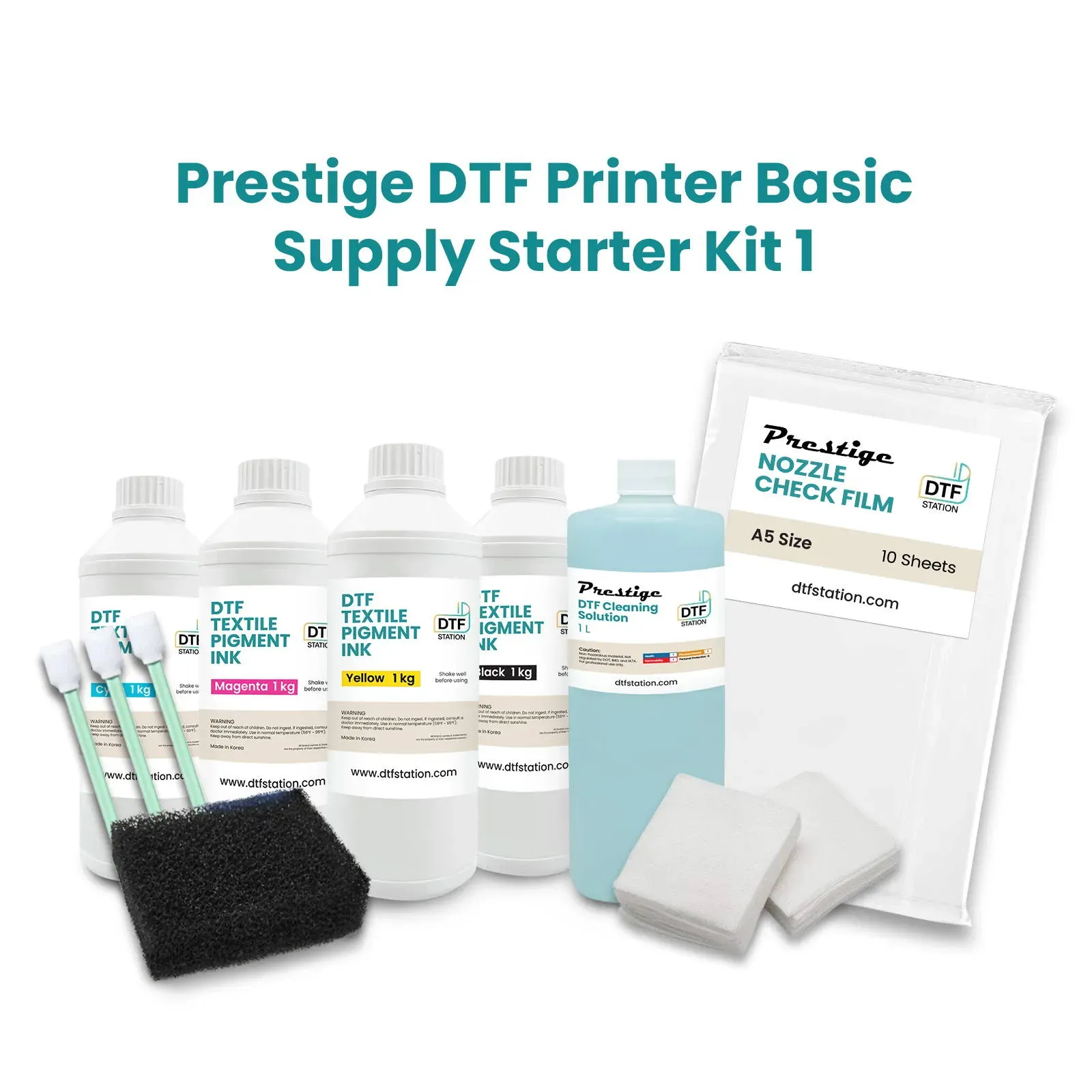DTF Supplies are transforming the way apparel printing businesses operate, offering a unique blend of efficiency and quality that traditional methods struggle to match. Direct-to-Film (DTF) printing stands out with its ability to create vibrant and intricate designs directly onto a variety of fabrics, making it a top choice for entrepreneurs and established businesses alike. By utilizing the right DTF printing supplies, you can elevate your custom apparel products and meet the growing consumer demand for personalized designs. This guide will equip you with a comprehensive checklist of essential DTF printing equipment and materials needed for a successful venture into the world of apparel printing. With the right approach, your business can harness the full potential of DTF technology to achieve stunning, high-quality outputs that cater to the market’s needs.
When it comes to enhancing apparel production, one must delve into the realm of direct-to-film technology and its associated materials. Direct-to-Film printing, or DTF, has gained traction as a preferred choice among those looking to innovate in custom garment creation. To effectively engage with this method, a comprehensive set of supplies is necessary, covering everything from printing machinery to specialized inks and transfer films. The ease of application and vibrant results offered by this printing technique provides businesses with the tools needed to stand out in a competitive market. Thus, understanding the essential apparel printing supplies, including those specifically designed for DTF processes, is crucial for anyone seeking to thrive in this dynamic industry.
Understanding the Key Components of DTF Printing Supplies
Direct-to-Film (DTF) printing requires a specific set of supplies that are integral to the process. At the heart of these supplies is the DTF printer, which is designed to deliver high-quality prints directly onto the transfer film. This film is specially coated to facilitate the transfer of vibrant designs to garments, ensuring excellent adhesion and durability. Without a reliable printer and high-quality film, achieving the desired results in custom apparel printing becomes nearly impossible. Therefore, understanding the key components that comprise the DTF printing supplies will set a solid foundation for anyone entering this exciting industry.
Alongside the printer and film, the inks used in DTF printing play a pivotal role in determining the vibrancy and longevity of the prints. Water-based inks in CMYK and white variations enable intricate designs and vivid colors on various fabric types. Additionally, using adhesive powders is essential after printing to bond the ink to garments effectively. Each component works synergistically to ensure an efficient printing process and high-quality apparel outcomes. Thus, being familiar with these key supplies not only helps in making informed purchases but also impacts the overall success of your apparel printing venture.
Choosing the Right DTF Printing Equipment
Selecting the right DTF printing equipment is crucial for achieving professional results in apparel printing. Among the top considerations is the type of DTF printer you choose. Models like the Epson L1800 are popular for beginners due to their ease of use and reliability. However, as your printing demands grow, you might need to consider more advanced printers that can handle higher production volumes. Pairing your printer with compatible high-quality DTF inks and transfer films ensures a cohesive printing experience that can minimize errors and maximize output quality.
Additionally, don’t overlook the importance of a heat press machine in your DTF printing setup. A commercial-grade heat press with adjustable settings allows for precise control over temperature and pressure, which is essential for effective transfers. Investing in quality printing equipment not only improves the aesthetics of the final product but also enhances durability and customer satisfaction. Therefore, thoroughly researching and investing in the proper DTF printing equipment can be a game-changer for your custom apparel printing business.
Essential DTF Inks and Their Importance
When embarking on a DTF printing journey, the choice of DTF inks is a vital aspect that significantly affects print quality. These inks are specially formulated to deliver vibrant colors on a variety of fabrics, making them essential for custom apparel printing. The standard color palette includes CMYK, and many products also feature a white ink option for printing on darker fabrics. This diverse application ensures that prints remain vivid and true to the original design, regardless of the fabric type selected for your apparel.
Moreover, using high-quality water-based inks not only enhances print vibrancy but also aligns with sustainability practices that many consumers value today. Non-toxic and eco-friendly inks are becoming increasingly available, making it easier for businesses to cater to environmentally conscious customers. Ultimately, recognizing the importance of selecting the right DTF inks will contribute to achieving stunning results in your garment printing while promoting sustainable practices within the industry.
The Role of Transfer Films in DTF Printing
Transfer films are essential components in the DTF printing process, as they serve as an intermediary between the printer and the garment. These films are specifically designed to accept DTF inks and facilitate their transfer onto fabrics when heat is applied. The quality of the transfer film can drastically influence the final appearance of the print, making it imperative for printers to select reputable brands known for their consistent performance. A reliable transfer film will ensure that the ink adheres properly, leading to sharper and more vibrant designs.
In addition to compatibility with inks, the durability of the transfer film is another critical factor. High-quality films can withstand the heat pressing process without losing their integrity, ensuring that the final product is both aesthetically pleasing and durable. Therefore, investing in superior transfer films not only enhances the quality of prints but also contributes to the overall longevity of custom apparel. This focus on quality sets businesses apart in a competitive market, ultimately leading to increased customer satisfaction.
Understanding Adhesive Powder in the DTF Process
Adhesive powder is a key ingredient in the DTF printing workflow, and its application plays a significant role in achieving successful transfers. After printing designs on the transfer film, the next step involves applying this powder while the ink is still wet. The powder melts during the heat press phase, creating a strong bond between the printed film and the garment. Choosing a high-quality adhesive powder ensures an even melt, preventing common issues like peeling or fading that can occur with inferior products.
Moreover, the right adhesive powder enhances the durability of the print once transferred, ensuring that the designs withstand multiple washes and wear over time. It’s essential for business owners to test different adhesive powders and determine which performs best with their DTF inks and films. By prioritizing quality in this aspect of the DTF process, businesses can ensure that their custom apparel not only looks great but also meets the demands of everyday wear, leading to higher customer satisfaction and repeat business.
Market Trends Driving DTF Printing Demand
The market for DTF printing has witnessed substantial growth, driven largely by the rising demand for personalized and custom apparel. This trend is particularly evident among small businesses and entrepreneurs who are seizing the opportunity to create unique garments without the high startup costs associated with traditional screen printing methods. DTF printing offers exceptional versatility, allowing businesses to produce small batches or one-off designs efficiently. Consequently, many entrepreneurs are exploring DTF printing as their go-to solution for custom apparel.
Additionally, the increased focus on sustainability within the industry is pushing suppliers to innovate eco-friendly DTF solutions, such as water-based inks and recyclable films. As consumers become more conscious of their purchasing decisions, printing businesses that offer sustainable alternatives position themselves favorably in the marketplace. By aligning with these market trends, apparel businesses not only enhance their product offerings but also appeal to a broader customer base interested in supporting sustainable practices.
Frequently Asked Questions
What are the essential DTF printing supplies needed for custom apparel printing?
To successfully start custom apparel printing using DTF (Direct-to-Film) technology, you’ll need essential supplies including a DTF printer, high-quality DTF inks, transfer films, adhesive powder, a heat press machine, and reliable cleaning supplies. Additionally, design software is necessary for preparing your digital files.
How does DTF printing differ from traditional apparel printing methods?
DTF printing differs from traditional methods like screen printing by using a unique process that involves printing designs onto a special film and transferring them with heat. This method allows for vibrant colors and intricate designs while being compatible with a wide range of fabrics. Moreover, DTF printing has lower startup costs, making it accessible for small businesses and entrepreneurs.
What should I consider when choosing DTF printing equipment?
When choosing DTF printing equipment, consider factors such as printer compatibility with DTF inks and films, the quality of the heat press machine, and the reliability of adhesive powders. Opt for printers like the Epson L1800 for beginners and ensure that all equipment supports high-quality output to achieve vibrant results on your custom apparel.
Are there any specific maintenance supplies required for DTF printers?
Yes, maintaining your DTF printer is crucial for optimal performance. You should invest in cleaning supplies specifically designed for printers, including printhead cleaning liquids and maintenance kits. Regular upkeep will help extend the life of your DTF printing equipment and ensure consistent print quality.
Can I use any type of fabric for DTF printing?
DTF printing is compatible with a wide variety of fabrics, including cotton, polyester, and blends. However, it’s essential to choose transfer films and inks that are optimized for the specific fabric type to achieve the best print results. Conduct tests on different materials to identify which ones work best for your custom apparel projects.
How do I ensure high-quality prints with DTF inks and transfer films?
To ensure high-quality prints with DTF inks and transfer films, it’s crucial to select high-quality materials from reputable brands. Look for films that are specially coated for optimal ink transfer and use DTF inks that are water-based for sustainability. Proper printer calibration and heat press settings also contribute significantly to the quality of your prints.
| Essential Supplies | Description |
|---|---|
| DTF Printer | A reliable printer specifically designed for DTF technology, like the Epson L1800, is crucial for quality prints. |
| DTF Inks | High-quality, water-based inks in CMYK, with optional white for dark fabrics. |
| Transfer Films | Specially coated films that ensure optimal ink transfer and quality prints. |
| Adhesive Powder | Used to bond the printed film to the garment when heated; quality affects print durability. |
| Heat Press Machine | A commercial-grade machine with adjustable settings for perfect transfers. |
| Cleaning Supplies | Specific cleaning products to maintain printer performance and longevity. |
| Software | Graphic design software necessary for creating DTF-compatible digital files. |
Summary
DTF Supplies are essential tools for anyone venturing into the dynamic world of apparel printing. This checklist provides a foundational guide to the key supplies required, including a reliable DTF printer, high-quality inks, transfer films, adhesive powders, and the proper heat press machine. By investing in the right materials, you can ensure vibrant and durable prints that meet the needs of your fashion-forward customers. Staying updated on recent innovations and market trends will further enhance your endeavor, allowing your business to thrive in the competitive landscape of custom apparel.

